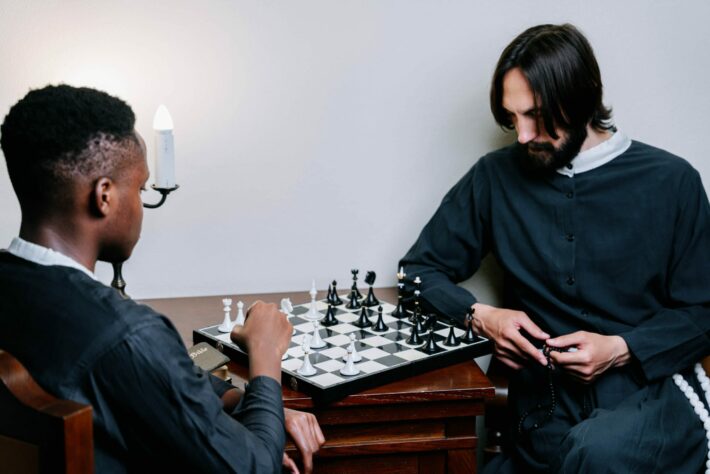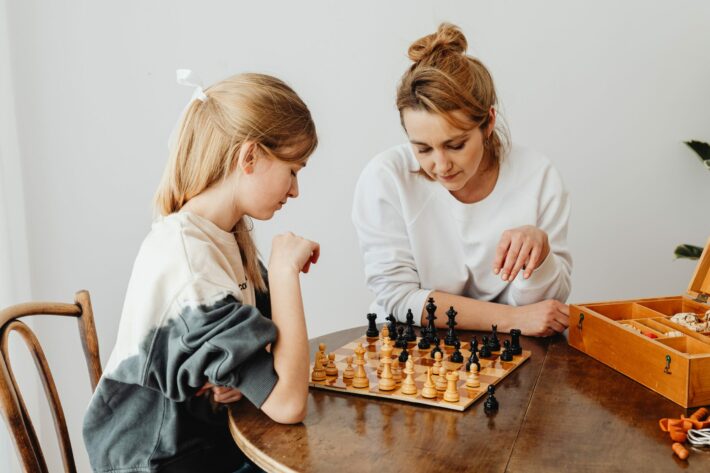In the realm of chess, the titles of Grandmaster and Master hold an aura of prestige and expertise. Aspiring players often wonder what sets these two levels of mastery apart. Understanding the difference between Grandmasters and Masters unravels the intricate layers of skill, strategy, and experience that define their gameplay.
From their approach to strategic thinking and decision-making to their training regimens and playing styles, a closer examination of these chess titans reveals the nuances that contribute to their domination on the board.
How does the skill level of a grandmaster compare to that of a master in chess?
Grandmasters in chess are widely regarded as the pinnacle of skill and expertise in the game. They possess an unparalleled mastery of strategic thinking, tactical prowess, and overall game understanding. Their skill level surpasses that of masters, who themselves are highly accomplished players.
Grandmasters exhibit a deeper understanding of complex positions, and advanced opening theory, and possess the ability to calculate intricate variations with remarkable accuracy. Their experience and exceptional decision-making abilities set them apart, allowing grandmasters to consistently outmaneuver opponents and make subtle yet powerful moves that ultimately lead to victory.
What are the key distinctions between a grandmaster and a master in the game of chess?

The distinctions between grandmasters and masters in chess lie in several key areas. Firstly, grandmasters typically have higher Elo ratings, a measure of skill level, compared to masters. Grandmasters also demonstrate a more profound understanding of chess principles, including strategic planning, accurate evaluation of positions, and dynamic piece coordination.
They exhibit a broader repertoire of opening variations, enabling them to adapt to diverse opponents effectively. Additionally, grandmasters possess superior tactical vision, enabling them to spot intricate combinations and calculate long sequences of moves with precision. These distinctions collectively contribute to the elevated status and prowess of grandmasters in the chess world.
What criteria are used to determine the title of grandmaster in chess?
The title of grandmaster in chess is a prestigious achievement that requires meeting specific criteria set by the World Chess Federation (FIDE). To obtain the grandmaster title, players must achieve three Grandmaster norms, which are performance-based results in high-level tournaments.
Additionally, players must surpass a minimum Elo rating threshold of 2500. These norms and rating requirements ensure consistency and demonstrate a high level of performance over time, validating a player’s mastery of the game. The process of attaining the grandmaster title involves years of dedication, rigorous training, and exceptional performance against formidable opponents.
How does the rating system differ for grandmasters and masters in chess?
The rating system in chess provides a numerical representation of a player’s skill level and performance. Both grandmasters and masters are assessed using the Elo rating system, which calculates ratings based on the outcome of games against opponents of varying skill levels.
However, grandmasters typically possess higher Elo ratings compared to masters due to their superior performance and results in top-level tournaments. The rating gap between grandmasters and masters reflects the difference in skill and allows for more accurate matchmaking and ranking within the chess community.
What level of experience and expertise is required to become a grandmaster or a master in chess?
Becoming a grandmaster or a master in chess necessitates a substantial level of experience and expertise. To achieve the grandmaster title, players usually accumulate years of competitive play, engage in intensive training programs, and participate in numerous high-level tournaments. It requires consistent success against strong opponents and the ability to perform exceptionally in critical situations.
Masters also undergo extensive training and accumulate considerable tournament experience, albeit at a slightly lower level compared to grandmasters. The journey to mastery in chess demands a deep passion for the game, unwavering commitment, and a relentless pursuit of improvement.
What are the specific titles and qualifications associated with being a grandmaster or a master in chess?
The title of grandmaster is the highest accolade in chess, bestowed upon players who meet the stringent criteria set by FIDE. It is a globally recognized and prestigious title. Masters, on the other hand, are accomplished players who have achieved a high level of skill but fall below the grandmaster status.
While the title of grandmaster is singular, there are various master titles awarded based on rating thresholds, such as International Master (IM) and FIDE Master (FM). These titles acknowledge players who have demonstrated exceptional skill and performance within their respective rating categories.
Are grandmasters significantly more skilled than masters in chess, or is the difference marginal?
The skill gap between grandmasters and masters in chess is significant, with grandmasters generally considered to be considerably more skilled. Grandmasters have attained the highest level of mastery in the game, showcasing superior strategic thinking, tactical acumen, and positional understanding.
Their ability to calculate complex variations and their exceptional decision-making skills often outshine those of masters. While masters exhibit formidable expertise and are highly accomplished players in their own right, grandmasters operate on an entirely different level, consistently displaying a depth of knowledge and precision that distinguishes them as the elite echelon of chess players.
What kind of training and preparation do grandmasters undergo compared to masters in chess?
Both grandmasters and masters undergo rigorous training and preparation to hone their chess skills. However, grandmasters typically dedicate more time and effort to training, given the higher level of competition they face. They engage in an extensive study of classic games, opening theory, and endgame techniques.
Grandmasters often work with coaches or mentors, analyze their games and those of other top players, and utilize computer chess engines to refine their understanding and tactical abilities. While masters also engage in similar training practices, the intensity and depth of preparation may differ slightly compared to grandmasters.
How do grandmasters and masters approach strategic thinking and decision-making in chess?
Grandmasters and masters employ distinct approaches to strategic thinking and decision-making in chess. Grandmasters have a broader arsenal of strategic ideas and possess a deep understanding of various plans and concepts. They excel at long-term strategic thinking, maneuvering their pieces to optimal squares, and exploiting positional weaknesses in their opponents’ positions.
Masters also exhibit strong strategic thinking but may not demonstrate the same level of depth and subtlety as grandmasters. Their decision-making is guided by solid chess principles, combined with their tactical awareness and the evaluation of concrete variations.
What distinguishes the playing styles and tactics of grandmasters and masters in chess?
The playing styles and tactics of grandmasters and masters in chess differ in notable ways. Grandmasters often adopt a more dynamic and ambitious approach, seeking imbalances and creating complexities on the board. They are skilled at initiating tactical skirmishes and exploiting imprecisions in their opponents’ play.
In contrast, masters often exhibit a more controlled and methodical style, focusing on solid and harmonious piece placement. While they possess tactical acumen, masters tend to prioritize positional understanding and gradually accumulate advantages. These divergent styles reflect the nuanced variations in thinking and decision-making between grandmasters and masters.
The table below shows that Distinguishing Playing Styles and Tactics: Grandmasters vs Masters in Chess:
| Aspect | Grandmasters | Masters |
|---|---|---|
| Strategic Approach | Grandmasters often exhibit exceptional long-term planning and positional understanding. | Masters possess solid strategic understanding but may not have the same level of depth and foresight as grandmasters. |
| Tactical Prowess | Grandmasters excel in calculating complex tactical sequences and finding subtle combinations. | Masters demonstrate strong tactical skills, but may not possess the same level of precision and resourcefulness as grandmasters. |
| Risk Assessment | Grandmasters are adept at evaluating risks and weighing potential gains, often making calculated sacrifices. | Masters also consider risks but may lean towards more conservative gameplay, prioritizing solid positions. |
| Adaptability | Grandmasters demonstrate exceptional adaptability, adjusting their playing style to suit various opponents and situations. | Masters possess a versatile approach but may rely on certain preferred strategies and openings more consistently. |
| Endgame Expertise | Grandmasters possess deep knowledge and understanding of complex endgame principles, often winning seemingly drawn positions. | Masters have strong endgame skills but may not possess the same depth of knowledge and resourcefulness as grandmasters. |
Are there any notable differences in the opening repertoire of grandmasters and masters in chess?

There are discernible differences in the opening repertoire of grandmasters and masters in chess. Grandmasters tend to have a more extensive and diverse range of openings at their disposal. They are well-versed in a wide array of variations and systems, allowing them to adapt to different opponents and game situations effectively.
Masters also possess a solid understanding of openings but may rely on a more limited set of variations, focusing on a narrower range of openings that suit their playing style. The disparity in opening knowledge and flexibility contributes to the strategic diversity observed between grandmasters and masters in the early stages of the game.
How do grandmasters and masters handle complex endgame situations in chess?
Grandmasters and masters approach complex endgame situations in chess with different perspectives and techniques. Grandmasters exhibit deep knowledge and understanding of endgame principles, enabling them to navigate seemingly drawn positions and find winning strategies. They possess a profound grasp of theoretical endgame concepts, such as pawn structures, king activity, and zugzwang.
Masters also possess strong endgame skills but may not possess the same level of depth and resourcefulness as grandmasters. They rely on fundamental endgame knowledge and practical decision-making to strive for favorable outcomes. Both grandmasters and masters understand the critical importance of endgame proficiency in securing victories.
What role does intuition play in the gameplay of grandmasters versus masters in chess?
Intuition plays a significant role in the gameplay of both grandmasters and masters in chess, albeit with some nuances. Grandmasters have honed their intuition through years of experience, allowing them to make instinctive decisions based on pattern recognition, positional understanding, and strategic insights.
They often rely on their intuitive sense to guide them in uncertain and complex positions, leading to remarkable moves and creative solutions. Masters also harness intuition, although to a slightly lesser extent compared to grandmasters. Their intuitive play is supported by solid chess knowledge and a well-developed sense of the game’s dynamics.
Are there specific psychological or mental attributes that separate grandmasters from masters in chess?
Specific psychological and mental attributes differentiate grandmasters from masters in chess. Grandmasters demonstrate exceptional focus, concentration, and mental endurance, allowing them to sustain high-level performance throughout lengthy games and tournaments. They possess unwavering self-belief and confidence, enabling them to make bold decisions and handle pressure situations effectively.
Grandmasters also exhibit remarkable resilience, bouncing back from defeats and maintaining a consistent performance. Masters share many of these attributes but may not possess the same level of mental fortitude and consistency as grandmasters. The psychological and mental traits of grandmasters contribute to their ability to achieve exceptional results in high-stakes chess competitions.
What opportunities and benefits do grandmasters have that masters may not have in the world of chess?
Grandmasters in the world of chess enjoy various opportunities and benefits that masters may not have. One significant advantage is the ability to compete in elite international tournaments, where they have the chance to face other top grandmasters and gain recognition on a global scale. Grandmasters often receive invitations to prestigious events and have more opportunities for sponsorships and endorsement deals.
They also enjoy higher visibility and media coverage, allowing them to share their expertise and inspire others through coaching, writing books, or providing online content. These opportunities and benefits contribute to the elevated status and career opportunities available to grandmasters.
Are there any age-related factors that influence the attainment of grandmaster or master titles in chess?

Age-related factors can influence the attainment of grandmaster or master titles in chess to some extent. Generally, achieving the grandmaster title at a younger age is more common, as it requires a combination of talent, dedication, and extensive training.
Young players have the advantage of starting their chess journey early, receiving specialized coaching, and benefiting from a more flexible learning mindset. However, age alone does not determine one’s ability to become a grandmaster or master. With passion, commitment, and the right training, players of any age can strive for and achieve these prestigious titles in chess.
Given these points
In the world of chess, the distinction between Grandmasters and Masters is far from arbitrary. It encompasses a multitude of factors, including skill level, training, tactical prowess, and psychological attributes. Grandmasters stand at the pinnacle of chess mastery, showcasing exceptional abilities that separate them from the accomplished Masters.
By deciphering the nuances between these two levels of expertise, chess enthusiasts gain a deeper appreciation for the game’s complexities and the remarkable abilities possessed by those who dominate the chessboard at the highest level.




